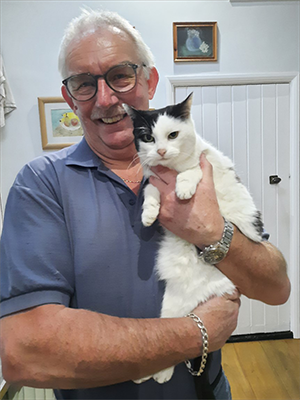Twelve-year-old Daisy has been through more than a few of her nine lives, having been hit by a car, suffered serious heart problems and undergone radioactive iodine therapy for hyperthyroidism. Daisy’s owner and Petplan customer Steve Dalton shares her incredible survival story.
Cat lovers Steve Dalton and his wife Hazel adopted Daisy and her sister Lillie eight years ago from the Stubbington Ark animal shelter in Hampshire. They knew Daisy had a heart murmur at the time, but they weren’t prepared for the health struggles ahead – or the extraordinary resilience she would show.
Surviving a car accident
One evening, a couple of years later, Daisy was hit by a car on the quiet road outside her home. ‘Somehow she found her way back to me. I was in the garden and knew as soon as I heard her cry that she was injured and something was seriously wrong,’ says Steve.
He rushed Daisy to the vet, who found that she had a broken back leg and internal bleeding. ‘They rang me next morning and said “she’s not going to survive”. Thankfully, half an hour later, they called again and said “she’s pulling through”. Daisy had a pin put in her broken leg, but her heart murmur caused complications, and she spent several days in intensive care.’

Developing cat hyperthyroidism symptoms
Remarkably, Daisy made a full recovery after her road accident. But a few years later, Steve noticed she was losing weight rapidly. After some blood tests, the vet diagnosed an overactive thyroid – a condition known as feline hyperthyroidism. The thyroid glands in Daisy’s neck were producing too much thyroid hormone, causing her metabolism to speed up.
Steve had to give her thyroid tablets daily. He explains: ‘She took them well, but after 14 months or so, she started getting thinner and thinner. As she was already on a high dose of medication, the vet and I decided she should have radioactive iodine treatment.’
This therapy required Daisy to have a single injection of radioactive iodine under the skin at the back of her neck at a specialist vet clinic. This is generally a safe and effective cat hyperthyroidism treatment, with permanent results and few side effects. The downside is that, after being treated, a cat must remain isolated at the clinic for six to eight weeks until their radiation levels subside to minimal levels. Owners can’t visit, and staff must wear protective equipment when feeding their feline patients or changing their litter, to avoid any radiation exposure.
After not being able to see Daisy during her weeks in isolation, Steve was delighted to get her home again. But it soon became clear that all was not going well. ‘When we got Daisy home, she was very thin and weak. The vet said it was probably due to the isolation, and that she was eating OK. But after a week she went lifeless. She didn’t want to eat, move or do anything,’ recalls Steve.
Showing signs of cat heart failure
After taking Daisy back to the vet’s, the prognosis wasn’t good. Not only did it seem that she was one of the unfortunate 1% of cats for whom the radioactive iodine treatment wasn’t successful, but she was also starting to show signs of heart failure, including a build-up of fluid in her chest. ‘It was a decision to either let her pass away or try to bring her back from the clutches of death. We chose the latter,’ Steve says.
‘So Daisy went into the veterinary hospital, and after a week or so, she began to pull through. Her weight had gone right down to under 2kg, but since I brought her home again, she has been getting better and better.’
Throughout Daisy’s health problems, Steve has been glad of his Petplan insurance cover. ‘Petplan has been marvellous. I’d recommend them 100%,’ he says. ‘They keep you informed of when a claim’s been paid, and whenever you speak to a member of staff on the phone, they’re always considerate and kind.’
Making a miraculous recovery
These days, with Steve carefully monitoring her food intake, Daisy’s weight has increased to a healthy 3.1kg. She needs bimonthly blood tests and takes six different medications a day for her heart and thyroid problems. Owners often find it difficult to give a cat tablets, but Steve doesn’t have any problems with Daisy. ‘She takes them fine with a pill popper and a syringe,’ he says. ‘I think she knows they’re helping her.’
Daisy may have been through more than one of her nine lives, but as Steve notes, the medicines are allowing her to enjoy a happy, healthy golden age: ‘She’s a bit of an old lady now, but she’s very content and pretty active. She goes in and out through her cat flap, and still goes hunting – although she mostly likes to spend her days lounging around in the garden, especially in summer.’
A treasured companion
Sadly, Steve lost his wife in recent years, while Daisy lost her sister, so the pair now value each other’s companionship more than ever. ‘Daisy’s a very loving cat, and great company for me,’ says Steve. ‘She is always sitting outside waiting for me when I get home, and is a constant companion by my side with a lot of cat chatter. She sits on my lap and sleeps with me in bed at night. I wouldn’t be without her!’
Has your cat also bounced back against the odds? Tell us about it on X or Instagram using the tag #PethoodStories, and we might be able to share their story!
